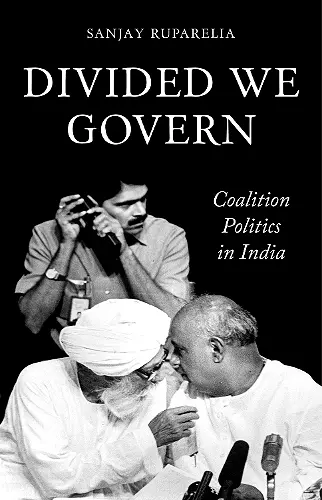Divided We Govern
Coalition Politics in Modern India
Format:Hardback
Publisher:C Hurst & Co Publishers Ltd
Published:17th Sep '15
Currently unavailable, and unfortunately no date known when it will be back

Divided We Govern investigates the rise and fall of the broader parliamentary left in modern Indian democracy, and the dynamics of national coalition governments. Since the 1970s, socialist, communist and regional parties in India have sought to forge a progressive 'third force'. Most scholars typically dismiss its principal manifestations -- the Janata Party, National Front and United Front -- as inherently opportunistic coalitions of power-seeking politicians. Sanjay Ruparelia provides a fine-grained analytic narrative to challenge this prevailing wisdom. Employing a variety of methods and resources, including the rare confidential testimonies of key political actors, Ruparelia demonstrates how the politics of each governing coalition, despite their self-evident flaws and short-lived tenures, revealed the outlines of a distinctive national vision. His fresh analysis of the politics of coalition in India also yields wider theoretical insights. Most studies fail to question or explain how these multiparty governments actually functioned. Hence they overstate the stability of and polarity between multiple political motivations, Ruparelia contends, discounting internal party debates over whether to share power, with whom and to what extent, and how. In such circumstances, the strategies, tactics and choices of actors become especially significant. The pursuit of power in a highly regionalized federal parliamentary democracy such as India creates incentives to forge national coalition governments, yet paradoxically decreases their chances of surviving. Ultimately, the failure of socialists and communists to judge their real historical possibilities at key junctures led to the decline of the broader Indian left.
'Ruparelia's work is admirable since it goes against the grain of popular understanding that the third-front politics is only about the loaves and fishes of office. He shows that the third-front can be better understood when we contextualize these formations and their performance in the politics of the larger social transformation taking place.' -- The Book Review
'[Ruparelia's] ability to avoid and correct misinterpretations, which are legion in the Indian media and some academic analyses, is impressive. [...] His assessments are consistently judicious, so that this book will surely stand as the locus classicus, the essential source, for studies of coalition politics between 1977 and 2014.' -- Pacific Affairs
'In a comprehensive work, Sanjay Ruparelia examines the rise, functioning and fall of all the three coalitions within a common framework. What sets the book apart is the positing of these coalitions consisting of the communist, socialist and regional parties as constituting a 'broader parliamentary left' seeking, since the 1970s, to evolve into a progressive 'third force'. [...] Ruparelia's narrative is replete with fascinating details of the formation, programmes and working of the three coalitions, together with interviews and rare personal confidential accounts from leaders.' -- Seminar
'The book brings much-needed attention to the study of coalition politics, a topic that has not been adequately studied. It [...] convincingly challenges uncharitable allegations about the entirely detrimental effects of coalition politics on Indian democracy.' -- Studies in Indian Politics
'An indispensable reference for future work on coalition politics in India, even for those working within the rational choice tradition and not just on the third front.' -- Economic & Political Weekly
'The study is extremely rich in sources and data and would be of help to students, researchers, political analysts and the media professionals. It is a major contribution to the literature on the federal structure and coalition politics in parliamentary democracy.' -- History and Sociology of South Asia
'This book is an outstanding study of coalition politics in India, a major development in the post-Congress phase that the recent rise of the BJP has not made redundant. Ruparelia not only offers a very detailed narrative, he also shows how coalition governments have paradoxically played a key role in the recent history of the "world's largest democracy" by restoring the rule of law after the Emergency, changing the social content of the regime under V.P. Singh or making overtures to estranged neighbours (including Pakistan and Bangladesh) during the Third Front of the 1990s. While we tend to put the emphasis on national parties at the expense of state parties which are the main actors of coalition politics, these smaller entities - which have won as many seats in 2014 as in 2009 - cannot be ignored any more, as evident from their representation in the Modi government.' -- Christophe Jaffrelot, Research Director at CNRS and author of Religion, Caste and Politics in India
'Divided We Govern finally lays to rest the notion that India was comprehensively mis-ruled in the last quarter of the twentieth century by weak and hopelessly divided Third Front coalitions. Sanjay Ruparelia's rich, rigorous and nuanced study reveals the achievements as well as the failures of the Janata, National Front and United Front governments. In so doing, Ruparelia contributes more generally to our understanding of the possibilities of coalition politics in a parliamentary democracy. This is a first-rate and important book.' -- Stuart Corbridge, Professor of International Development and Provost, London School of Economics and Political Science
ISBN: 9781849042123
Dimensions: unknown
Weight: unknown
288 pages